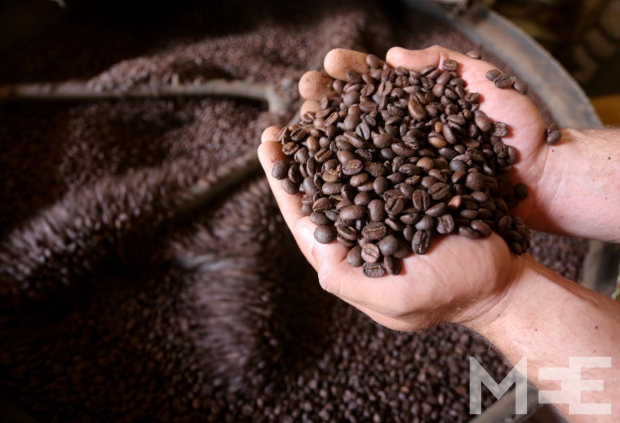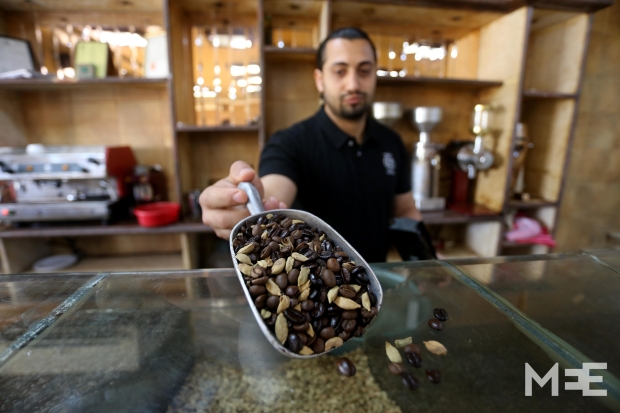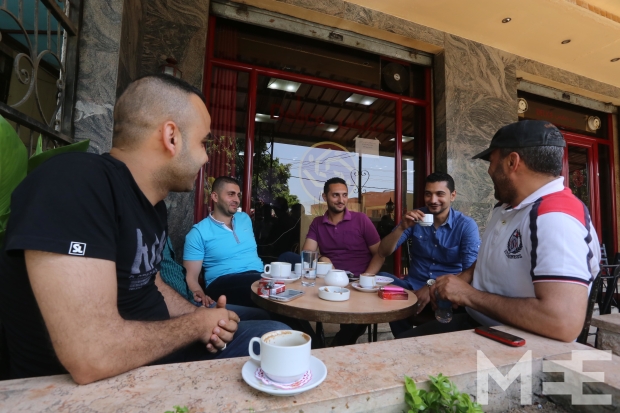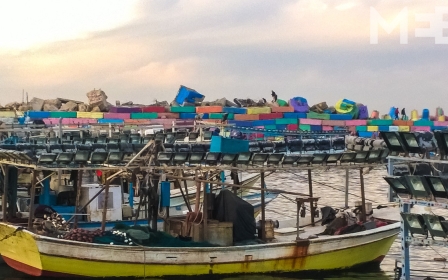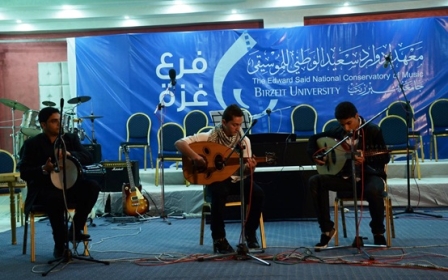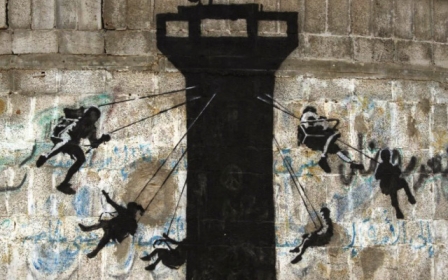Coffee in Gaza: Shared in times of joy and sorrow
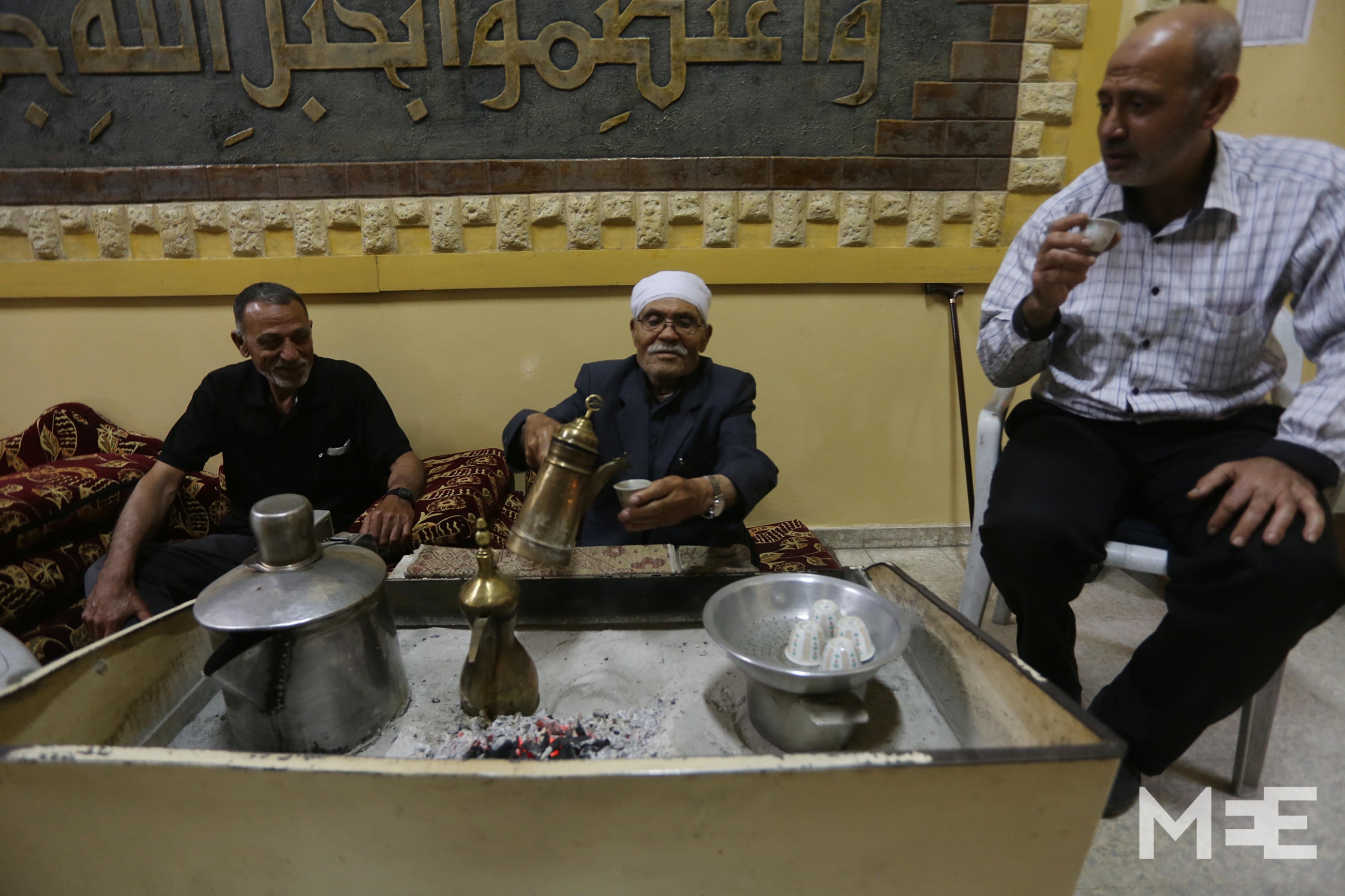
GAZA CITY - It's around midday on a sunny afternoon and Cafe Delice is filled with dozens of young men who describe themselves as "coffee connoisseurs". They have taken a short break from their jobs to join their friends. They savour a moment together, drinking their favourite coffee, the fragrance of which can be appreciated even down the street as far away as the main hospital in the city.
Ibrahim Sbaih, a merchant in Gaza, considers himself to be one of the most loyal patrons of the cafe ever since its founding 17 years ago. He still frequents the cafe and visits twice a day. "What once was a pleasure has become a necessity," Sbaih explains with a smile.
"Baristas here boast superior skills in the preparation of coffee, just as I have a keen eye and taste for the presentation of coffee," 37-year-old Sbaih told Middle East Eye. "The taste of coffee in Gaza is very unique. It is the best gift I could offer my Egyptian friends who ask me to bring them some every time I travel from Gaza to Cairo," he says proudly.
Coffee merchants in Gaza believe that the Strip has the largest production line, as well as the greatest customer base, in the Middle East - although that is hard to verify. Gazan coffee is available through 30 grinders who import - when possible - from Brazil, India, Ethiopia, Guatemala and Colombia.
The unique taste of the local coffee is not easily achieved; it is a result of complex mixtures and multiple production steps. Prices in Gaza cafés range from 50 cents to three dollars for a single luxurious cup.
Five tonnes per day
It is difficult to imagine visiting a home or a place of work in Gaza without being offered a cup of coffee; it is similar to the tea rituals of Egypt or sharing a bottle of wine in France. Adding sugar or milk to coffee is rare in Gaza. The residents of Gaza collectively consume more than five tonnes of the brown powder per day, the staff at Delice say.
Abdul Hafiz Osman, the general manager of Delice, believes that the locals' passion for drinking coffee has increased over the past 10 years. Before that, tea was much more prevalent. There is a local proverb that coffee must be drunk when smoking a shisha, or when enjoying traditional sweets such as baklava, so as to enjoy the opposing bitter and sweet flavours together.
"Palestinians who have returned from the Arabian Gulf, EU and the USA imported the coffee culture and blends that are new to the region," Osman said. "About 80 percent of Gaza's population (1.8 million) are thought to be coffee consumers."
Osman noted that coffee manufacturers faced difficulties in marketing the product originally since many people were unfamiliar with coffee, but today, their roast sells more than 350kg per day at $15 per kilo. It has become a significant industry.
"We hired a French expert to train two baristas in the preparation of coffee at the café in 1996. Today, we produce 10 varieties of coffee. We opened the first coffee shop in Gaza. We chose the name 'Delice', a famous name in France, a light name that appeals to everyone," Osman added.
"Today, coffee imposes its presence before breakfast, after lunch, in the evening hours, and at social events, joyous or sad. It is associated with family gatherings and must be shared when feuding families reconcile in a sort of coffee-drinking ritual."
In Delice's lobby, glass facades overlook the main street, and the aroma of coffee roasting with a mixture of cardamom powder, musk, saffron and ginger fills the air. Baristas prepare individual cups of coffee according to each customer's taste, while others sell customers packets of their favorite roasts to prepare at home.
Café's Delice's owners in Gaza believe that most of their customers are between 20-40 years old. Coffee was once the drink of choice of the elders, but its rich flavour has made it a hit among the young as well.
"Daily problems like the blockade and the deadlock in the case of reconstruction, or even social problems, urge people in Gaza to find a relaxing moment over a cup of coffee - it can lighten their mood," Sbaih said.
Economic deterioration
The nine–year-old Israeli siege and closure of the Rafah border crossing with Egypt - the only escape route for the people of Gaza to reach the outside world - and their inability to live with other cultures through travel, has resulted in an entire generation of Gazan youth being collectively homebound. Their one escape is to meet with friends every evening in cafes.
"This illegal blockade caused a huge increase in the price of coffee; a tonne of green coffee beans from the US used to cost $2,900. It now costs more than $6,200. And while a kilo of cardamom was seven dollars, it has swiflty increased to $28," Osman said.
The deteriorating economic situation in Gaza and the irregular receipt of salaries for more than 45,000 government employees, coupled with an unemployment rate of 65 percent, forces customers to buy items in small quantities. For example, a big seller in the market is a small package of coffee that has enough contents to prepare about three cups of coffee. The small package sells for 25 cents.
Delice's production plant was shelled during the latest 51-day Israeli war on Gaza war last summer. Their losses totalled nearly $600,000, according to Osman.
"We had to re-import machines for coffee production again, via Israel. It took 120 days to cross over to Gaza, under the pretext of security," he said. Today, the plant operates at a quarter of its production capacity.
Tonnes of green coffee beans used to be smuggled through tunnels between Egypt and the Gaza Strip, before 2013. The destruction of those tunnels forced owners and producers to import through Israel, a difficult process.
While growing coffee locally could be a viable alternative for Gaza, the climate prohibits such a venture. Moreover, Osman fears that coffee production is a hazardous industry due to its link to the global stock market, as coffee and cocoa commodities regularly fluctuate.
White coffee
Heading to the east of Gaza, Youssef Ayoubi empties 50kg bags of green coffee beans into his roaster, which was originally used to produce "white coffee". Ayoubi, 33, is the owner of the roasting plant and explains that his establishment employs many families and provides a unique product for coffee drinkers that prefer their coffee roasted with a special steaming technique.
"Some elderly customers prefer to buy green coffee and roast it in their homes to add their own flavours," said Ayoubi. "The diwans of Palestinian families are famous for white coffee, which contains a high proportion of cardamom, similar to the blends famous in Saudi Arabia."
Both Delice and Ayoubi roasters are able to export abroad, especially to Egypt, but the continued closure of Gaza's crossings is a huge obstacle to increased growth. Both owners say that their customers often take large amounts of the local coffee as gifts for their relatives in Egypt and Jordan.
In the holy month of Ramadan, which started mid-June, these cafes are closed throughout the daylight hours, when Muslims are prohibited from eating and drinking. But once dusk approaches, Gaza's coffee shops will be filled to the brim with young and old customers alike, who will come to enjoy the rich Gaza roasts with family and friends until the first light of dawn.
New MEE newsletter: Jerusalem Dispatch
Sign up to get the latest insights and analysis on Israel-Palestine, alongside Turkey Unpacked and other MEE newsletters
Middle East Eye delivers independent and unrivalled coverage and analysis of the Middle East, North Africa and beyond. To learn more about republishing this content and the associated fees, please fill out this form. More about MEE can be found here.


